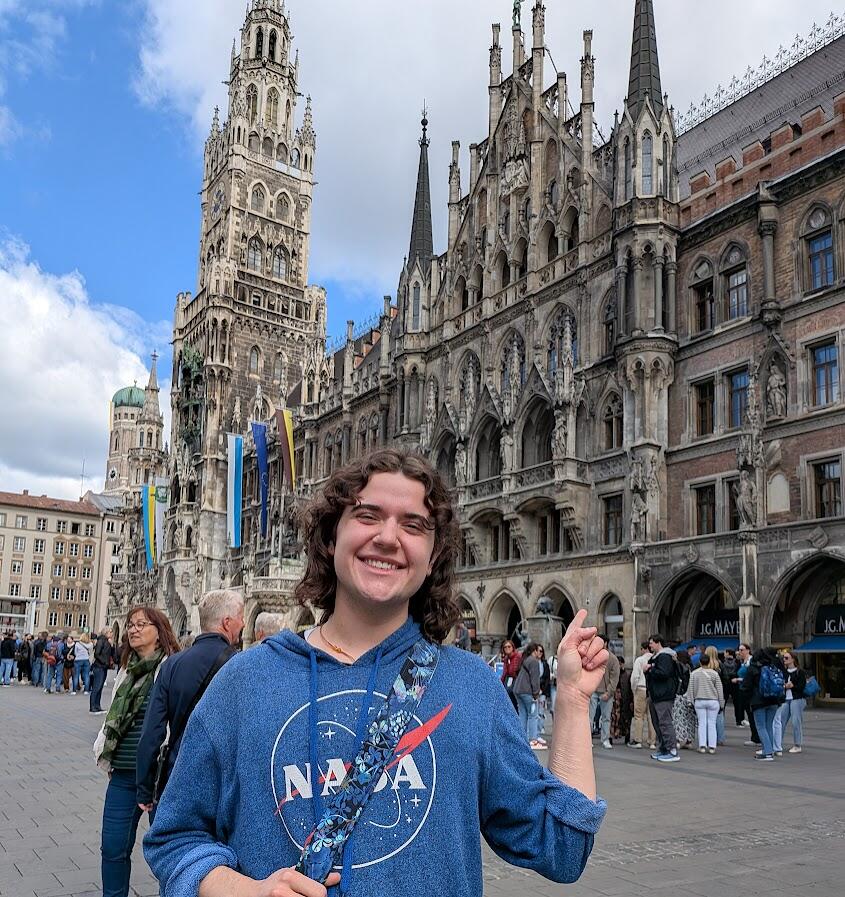Family ties, including a father’s illness, propel a son’s research journey
By Sian Wilkerson
Nic Carwile had always gravitated toward science, but it wasn’t until his father was diagnosed with a neurogenerative disorder that his ultimate path became clear.
“Life struck,” said Carwile, a rising senior at Virginia Commonwealth University, “and it was a shock. The longer I sat with it, I was like: If there is something I can do to forward the field of research in my father’s disease [while also] establishing my career, that’s perfect. And that’s where I settled on neuroscience.”
Carwile, a Chesterfield County native, is majoring in biology and minoring in chemistry in the College of Humanities and Sciences. This summer, he is participating in a research internship in Germany at the Ludwig Maximilian University of Munich, where he works at the Haass Lab studying the biochemistry of Alzheimer’s disease.
The opportunity is through RISE Germany – the Research Internships in Science and Engineering initiative that lets undergraduate students from North American, British and Irish universities participate in summer programs at top German universities and research institutions. Carwile received support from VCU’s Internship Funding Program, which helps cover costs associated with summer internships.
On weekdays at the lab, Carwile works with cell cultures and biochemistry projects while improving his research and writing skills. On weekends, he explores a country that holds plenty of personal meaning.

With a German immigrant mother, Carwile is a dual citizen of Germany and the United States. Despite his family connection, he hasn’t previously forged many ties to the European country, so his three-month RISE internship holds special resonance.
“This is a very nice opportunity to improve my German language speaking and reconnect with family,” he said. “I got lucky with where I ended up [because] my grandma is two hours away by train, so I get to visit her on the weekends from time to time.”
When not visiting family, Carwile explores Munich’s museums and its nearby natural wonders: “There’s a lot of culture to enjoy, so it’s been really lovely.”
At VCU, Carwile works in the Hamilton Lab with Peter J. Hamilton, Ph.D., assistant professor in the School of Medicine’s Department of Anatomy and Neurobiology, where researchers study how psychological stress or drug-use experience changes the brain.
With graduation approaching, Carwile is applying to graduate and Ph.D. programs.
“I can see myself in a lot of roles [in the future],” he said. “I’m someone who enjoys working with people. I enjoy my lab work and my bench work, but I do really like seeing the impact of things I’m doing and seeing that I’m helping people. So I would hope for a more person-facing role, whether that be something where I’m interacting with patients or policymakers.”
For other students looking to pursue research internship experience, “it’s important to know what you’re looking for,” Carwile said.
“I had a really specific needle to thread: I wanted to go to Germany, and I wanted to research neurodegenerative disorders,” he said. “And beyond that, I just wanted to gain more research experience so that I had a better idea of where I wanted to go next.
“So that’s tip one,” he said. “Tip two is, just persevere.”
Subscribe to VCU News
Subscribe to VCU News at newsletter.vcu.edu and receive a selection of stories, videos, photos, news clips and event listings in your inbox.
Latest Student success
- Learning at the intersection of OB-GYN and addiction treatmentThrough early clinical exposure and innovative curriculum, the OB MOTIVATE clinic prepares physicians to deliver compassionate care to pregnant and postpartum patients with substance use disorders.
- Alexis Washington is sporting experience from the TV studioFramed by summer internships, the broadcast journalism student will help VCU Athletics in the fall.
- What to wear at VCU? Depends on what you’re studyingTwo VCUarts students who styled looks representing wide-ranging academic majors share insights from the process – and some fashion advice, too.
- Nursing students use art to explore psychiatric-mental health topics in innovative final projectAs part of a class project, students made art to explore complex mental health topics, turning classroom concepts into powerful visuals rooted in empathy and clinical understanding.
- How did VCU students help Virginia protect health data? By making ‘noise.’The School of Business team partnered with the behavioral health department to facilitate research while safeguarding individual privacy.
- Love in a packing box? VCU Brandcenter students collaborate with advertising pros.The production master class helps bring spec scripts to life in partnership with Richmond creative companies.






